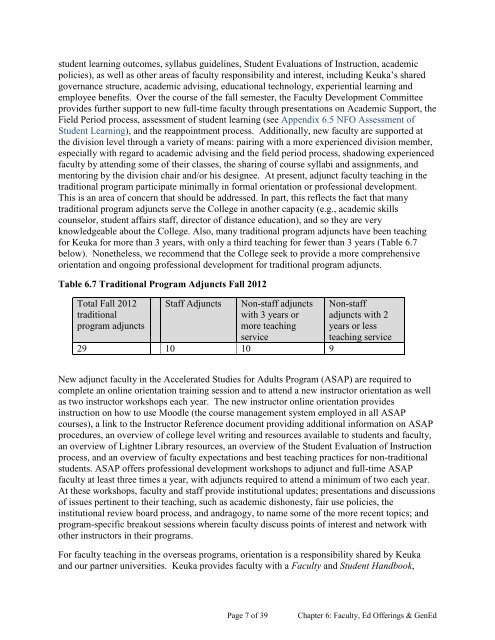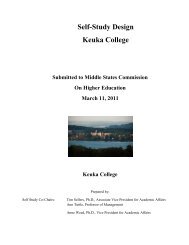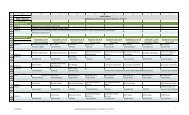final version of the self-study document - Keuka College's Middle ...
final version of the self-study document - Keuka College's Middle ...
final version of the self-study document - Keuka College's Middle ...
You also want an ePaper? Increase the reach of your titles
YUMPU automatically turns print PDFs into web optimized ePapers that Google loves.
student learning outcomes, syllabus guidelines, Student Evaluations <strong>of</strong> Instruction, academic<br />
policies), as well as o<strong>the</strong>r areas <strong>of</strong> faculty responsibility and interest, including <strong>Keuka</strong>’s shared<br />
governance structure, academic advising, educational technology, experiential learning and<br />
employee benefits. Over <strong>the</strong> course <strong>of</strong> <strong>the</strong> fall semester, <strong>the</strong> Faculty Development Committee<br />
provides fur<strong>the</strong>r support to new full-time faculty through presentations on Academic Support, <strong>the</strong><br />
Field Period process, assessment <strong>of</strong> student learning (see Appendix 6.5 NFO Assessment <strong>of</strong><br />
Student Learning), and <strong>the</strong> reappointment process. Additionally, new faculty are supported at<br />
<strong>the</strong> division level through a variety <strong>of</strong> means: pairing with a more experienced division member,<br />
especially with regard to academic advising and <strong>the</strong> field period process, shadowing experienced<br />
faculty by attending some <strong>of</strong> <strong>the</strong>ir classes, <strong>the</strong> sharing <strong>of</strong> course syllabi and assignments, and<br />
mentoring by <strong>the</strong> division chair and/or his designee. At present, adjunct faculty teaching in <strong>the</strong><br />
traditional program participate minimally in formal orientation or pr<strong>of</strong>essional development.<br />
This is an area <strong>of</strong> concern that should be addressed. In part, this reflects <strong>the</strong> fact that many<br />
traditional program adjuncts serve <strong>the</strong> College in ano<strong>the</strong>r capacity (e.g., academic skills<br />
counselor, student affairs staff, director <strong>of</strong> distance education), and so <strong>the</strong>y are very<br />
knowledgeable about <strong>the</strong> College. Also, many traditional program adjuncts have been teaching<br />
for <strong>Keuka</strong> for more than 3 years, with only a third teaching for fewer than 3 years (Table 6.7<br />
below). None<strong>the</strong>less, we recommend that <strong>the</strong> College seek to provide a more comprehensive<br />
orientation and ongoing pr<strong>of</strong>essional development for traditional program adjuncts.<br />
Table 6.7 Traditional Program Adjuncts Fall 2012<br />
Total Fall 2012<br />
traditional<br />
program adjuncts<br />
Staff Adjuncts Non-staff adjuncts<br />
with 3 years or<br />
more teaching<br />
service<br />
29 10 10 9<br />
Non-staff<br />
adjuncts with 2<br />
years or less<br />
teaching service<br />
New adjunct faculty in <strong>the</strong> Accelerated Studies for Adults Program (ASAP) are required to<br />
complete an online orientation training session and to attend a new instructor orientation as well<br />
as two instructor workshops each year. The new instructor online orientation provides<br />
instruction on how to use Moodle (<strong>the</strong> course management system employed in all ASAP<br />
courses), a link to <strong>the</strong> Instructor Reference <strong>document</strong> providing additional information on ASAP<br />
procedures, an overview <strong>of</strong> college level writing and resources available to students and faculty,<br />
an overview <strong>of</strong> Lightner Library resources, an overview <strong>of</strong> <strong>the</strong> Student Evaluation <strong>of</strong> Instruction<br />
process, and an overview <strong>of</strong> faculty expectations and best teaching practices for non-traditional<br />
students. ASAP <strong>of</strong>fers pr<strong>of</strong>essional development workshops to adjunct and full-time ASAP<br />
faculty at least three times a year, with adjuncts required to attend a minimum <strong>of</strong> two each year.<br />
At <strong>the</strong>se workshops, faculty and staff provide institutional updates; presentations and discussions<br />
<strong>of</strong> issues pertinent to <strong>the</strong>ir teaching, such as academic dishonesty, fair use policies, <strong>the</strong><br />
institutional review board process, and andragogy, to name some <strong>of</strong> <strong>the</strong> more recent topics; and<br />
program-specific breakout sessions wherein faculty discuss points <strong>of</strong> interest and network with<br />
o<strong>the</strong>r instructors in <strong>the</strong>ir programs.<br />
For faculty teaching in <strong>the</strong> overseas programs, orientation is a responsibility shared by <strong>Keuka</strong><br />
and our partner universities. <strong>Keuka</strong> provides faculty with a Faculty and Student Handbook,<br />
Page 7 <strong>of</strong> 39 Chapter 6: Faculty, Ed Offerings & GenEd




